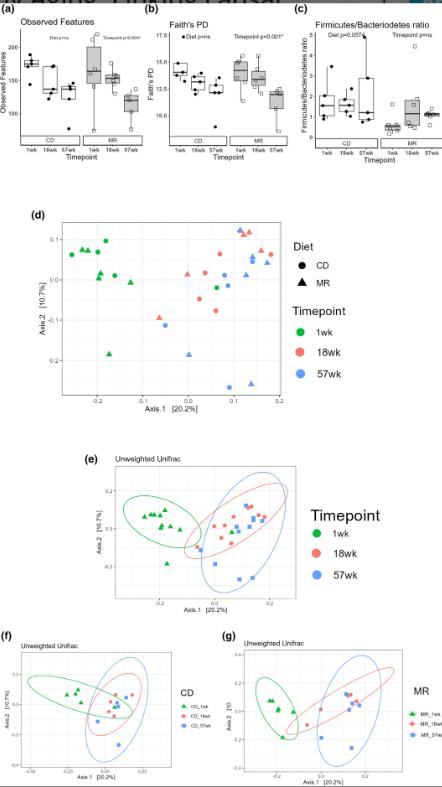💡 Methionine Restriction (MR) has emerged as a potential anti-aging intervention with metabolic benefits in model organisms. This study investigates the intricate interplay between MR, aging, and the gut microbiome in male mice. Initiated at 6 months and spanning until 22 months, the MR diet resulted in reduced body weight, altered body composition, and increased insulin sensitivity. Surprisingly, 16S rRNA amplicon sequencing of fecal samples revealed minimal long-term impact on the gut microbiome composition, with age outweighing diet effects. Specific taxa changes at early time points suggest transient microbiota alterations. Insights into the metabolic pathways associated with MR, such as FGF-21 signaling and GH/IGF-1 axis inhibition, provide a comprehensive understanding of the observed effects.
📍 Key Findings:
📌 Metabolic Changes: MR induces a decrease in body weight, fat mass, and bone mineral density, accompanied by increased lean mass and insulin sensitivity.
Indirect calorimetry markers, including energy expenditure, oxygen consumption, and carbon dioxide production, align with previously reported MR-induced metabolic changes.
📌 Gut Microbiome Dynamics: Long-term MR exhibits minimal impact on alpha and beta diversity metrics, with age emerging as a predominant factor in microbiota changes.
Specific taxa changes attributable to the diet are observed at 1 and 18 weeks, emphasizing short-term effects and transient alterations.
📌 Comparison with Other Models: Distinct metabolic signatures are observed in MR mice compared to growth hormone-releasing hormone knockout (GHRH-KO) and caloric restriction (CR) mice.
Novel insights into glucose oxidation (GOX) and fatty acid oxidation (FOX) rates in MR mice are reported for the first time.
📌 there were consistent aging-associated changes across both groups, with an increase in 𝘐𝘭𝘦𝘪𝘣𝘢𝘤𝘵𝘦𝘳𝘪𝘶𝘮 𝘢𝘯𝘥 𝘌𝘳𝘺𝘴𝘪𝘱𝘦𝘭𝘰𝘵𝘳𝘪𝘤𝘩𝘢𝘤𝘦𝘢𝘦 with age, while 𝘌𝘶𝘣𝘢𝘤𝘵𝘦𝘳𝘪𝘶𝘮, 𝘤𝘰𝘱𝘳𝘰𝘴𝘵𝘢𝘯𝘰𝘭𝘪𝘨𝘦𝘯𝘦𝘴 𝘨𝘳𝘰𝘶𝘱, 𝘙𝘶𝘮𝘪𝘯𝘰𝘤𝘰𝘤𝘤𝘢𝘤𝘦𝘢𝘦, 𝘗𝘦𝘱𝘵𝘰𝘤𝘰𝘤𝘤𝘢𝘤𝘦𝘢𝘦, 𝘢𝘯𝘥 𝘗𝘦𝘱𝘵𝘰𝘤𝘰𝘤𝘤𝘶𝘴 decreased with age.
📍 The study discusses potential mechanisms underlying MR-induced metabolic changes, including FGF-21 signaling and GH/IGF-1 axis inhibition. Further providing comprehensive insights into the long-term effects of MR on both metabolic parameters and the gut microbiome. While age significantly influences gut microbiota, the minimal impact of MR on the microbiome suggests alternative pathways driving its metabolic effects. The findings contribute to unraveling the complexities of dietary interventions, aging, and the gut microbiome, paving the way for future investigations into the specific mechanisms underpinning MR-induced metabolic changes.
Link to the article : http://tinyurl.com/jen8ta8t
